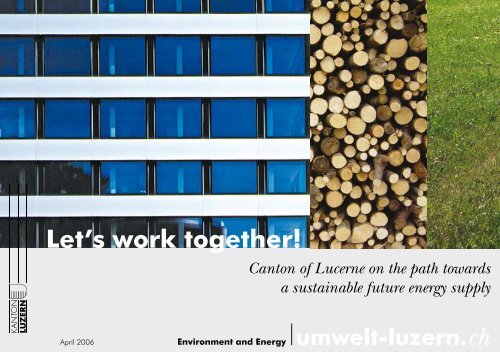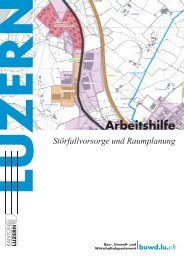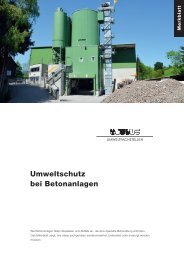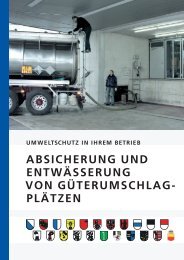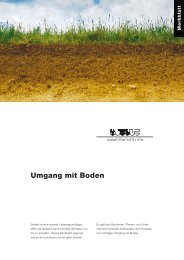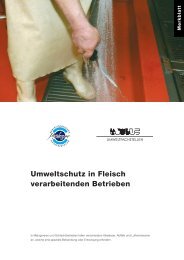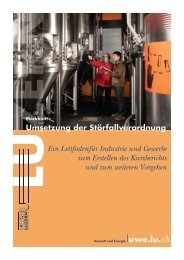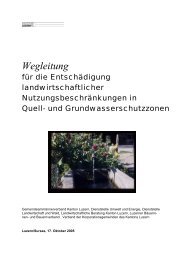Let's work together! - uwe - Kanton Luzern
Let's work together! - uwe - Kanton Luzern
Let's work together! - uwe - Kanton Luzern
You also want an ePaper? Increase the reach of your titles
YUMPU automatically turns print PDFs into web optimized ePapers that Google loves.
Let’s <strong>work</strong> <strong>together</strong>!<br />
Canton of Lucerne on the path towards<br />
a sustainable future energy supply<br />
April 2006<br />
Environment and Energy<br />
umwelt-luzern.ch
Editorial comment<br />
The energy policy of the Canton<br />
of Lucerne focuses on four priorities:<br />
renovation of buildings, use<br />
of wood energy, use of biogas,<br />
and information/communication.<br />
The Canton of Lucerne aims<br />
to intensify its activities in these<br />
areas, and is able to count on<br />
the support of reliable partners<br />
in the trade and industry sectors,<br />
as well as municipalities and<br />
associations, numerous property<br />
managers and owners. A variety<br />
of procedures can lead to success,<br />
but what is required above<br />
all is close co-operation between<br />
the major players at all levels<br />
(trade and industry, municipalities,<br />
federal government, cantonal<br />
authorities). And as this brochure<br />
demonstrates, the first steps in<br />
this direction have already been<br />
taken.<br />
April 2006<br />
Contents<br />
4 Benefits all round<br />
5 Modernising the right way<br />
6 Time to think about alternatives<br />
7 Minergie standard – combining comfort and energy efficiency<br />
8 Minergie-P – pioneering energy efficiency<br />
9 Heat from our forests<br />
10 Large-scale heat production<br />
11 Electricity from the UNESCO biosphere in Entlebuch<br />
12 Sewage as an energy source<br />
13 Green power from the farmyard<br />
14 Motor fuel from biogas<br />
15 General information<br />
Published by:<br />
Umwelt und Energie (<strong>uwe</strong>)<br />
<strong>Kanton</strong> <strong>Luzern</strong><br />
Libellenrain 15, Postfach 3439<br />
6002 Lucerne<br />
Phone 041 228 60 60<br />
www.energie-luzern.ch<br />
<strong>uwe</strong>@lu.ch<br />
Concept:<br />
Rudolf Baumann-Hauser,<br />
Head of Energy Section<br />
Supportet by:<br />
Business Development Lucerne<br />
Patrik Wermelinger<br />
Promotion & Marketing<br />
Alpenquai 30, 6005 Lucerne<br />
Phone 041 367 44 00<br />
www.lucerne-business.ch<br />
info@lucerne-business.ch<br />
Production:<br />
Energie Treuhand ETL AG<br />
Stefan Krummenacher<br />
6039 Root Längenbold<br />
Oerlikon Journalisten<br />
Othmar Humm, Donald Sigrist<br />
8050 Zurich<br />
Photos:<br />
Page 9, 14: photocase<br />
Page 12: ARA Region <strong>Luzern</strong><br />
Page 13: Kefalas/Coopzeitung<br />
Reference:<br />
The editing of the english version<br />
has been supported by the Swiss<br />
Federal Energy Office SFOE.
We’re all in this <strong>together</strong>!<br />
Climate protection is something<br />
that concerns us all. Switzerland<br />
has undertaken a commitment<br />
to significantly reduce its CO 2<br />
emissions by 2010, and we, the<br />
citizens of the canton of Lucerne,<br />
want to make our own contribution<br />
»We’re all in this <strong>together</strong>! So let’s <strong>work</strong><br />
<strong>together</strong> to protect our climate and our<br />
environment.«<br />
towards this goal. We can do this<br />
by reducing energy demand, using<br />
energy more efficiently and fully<br />
exploiting the economic potentials<br />
of renewable forms of energy.<br />
In the canton of Lucerne, we want<br />
to increase energy efficiency by<br />
constructing new buildings with low<br />
energy requirements and improving<br />
energy consumption in existing<br />
buildings. In a heavily forested<br />
canton like Lucerne, it also makes<br />
sense to promote the use of wood<br />
as a fuel, since it is CO 2 -neutral.<br />
And since the structure of our canton<br />
is primarily rural, there is also<br />
a considerable potential for the<br />
utilisation of biomass, especially<br />
in the form of biogas obtained<br />
from farms and sewage treatment<br />
plants.<br />
We are fortunate to have a number<br />
of companies in our canton that<br />
can be regarded as pioneers in the<br />
area of energy-efficient construction.<br />
Our ongoing campaign<br />
aimed at promoting the use of<br />
wood both as a building material<br />
and as an energy source was initiated<br />
more than a year ago. ARA<br />
Region <strong>Luzern</strong> is the first sewage<br />
treatment plant in Switzerland to<br />
produce sewage gas of equivalent<br />
quality to natural gas, and feed it<br />
into the pipeline. We are making<br />
progress in realising our own<br />
goals and supporting the efforts<br />
of the federal government, but<br />
we also rely heavily on the strong<br />
commitment of players in trade<br />
Max Pfister<br />
and industry, energy specialists,<br />
property owners and of course all<br />
consumers.<br />
This brochure sets out to inform<br />
you about ways in which you,<br />
too, can become active, and to<br />
encourage you to make a practical<br />
contribution.<br />
Our canton is on the path towards<br />
a sustainable future energy supply.<br />
We hope you will accompany us!<br />
Max Pfister, member of the government<br />
of the Canton of Lucerne.
Renovation of buildings<br />
Benefits all round<br />
Many buildings in our canton are<br />
ageing and need of improvement.<br />
Deteriorating buildings often mean<br />
a higher energy requirement, a<br />
lower standard of comfort, and<br />
in some cases they may even be<br />
structurally damaged. But most of<br />
these undesirable consequences<br />
can be minimised or even eliminated<br />
al<strong>together</strong> as the result of<br />
comprehensive modernisation. In<br />
this way we can ease the burden<br />
on the environment, enhance our<br />
level of living comfort and cut our<br />
energy costs, as the example set by<br />
a building co-operative in Kriens<br />
clearly demonstrates. In the period<br />
Thanks to intelligent modernisation,<br />
these two apartment houses<br />
in Kriens now consume 21,000<br />
litres less heating oil a year – a<br />
tangible contribution towards climate<br />
protection.<br />
from 2001 to 2005, »Familienbaugenossenschaft<br />
Kriens« renovated<br />
two apartment houses (Fenkernstrasse<br />
19 and 21) containing<br />
a total of 38 apartments. The installation<br />
of modern windows and<br />
the insulation of the building shell<br />
proved to be highly effective. 40<br />
square metres of solar collectors<br />
make a valuable contribution towards<br />
hot-water production, while<br />
room heating now comes from an<br />
oil-fired condensation system. As a<br />
result of these improvements, the<br />
heating requirements in the two<br />
buildings have fallen by more than<br />
40 percent.<br />
The authorities of the city of<br />
Lucerne want to encourage<br />
property owners to renovate their<br />
buildings, and for this purpose<br />
they are offering financial assistance<br />
as well as energy consulting<br />
services. Further information:<br />
www.luzern-erneuert.ch
Renovation of buildings<br />
Modernising the right way<br />
Structural deterioration of a building<br />
negatively influences its value<br />
on the real estate market, and this<br />
applies to both commercial and<br />
residential property. Furthermore,<br />
sharply rising oil and gas prices<br />
are constantly driving up heating<br />
costs. Once a decision has been<br />
made to modernise a building, it<br />
is essential for the job to be done<br />
properly. In order to preserve the<br />
building’s value over the long<br />
term, and thus secure an adequate<br />
return on investment, it needs to be<br />
modernised comprehensively and<br />
systematically.<br />
With a combination of heat insulation<br />
and high quality windows<br />
it is possible to reduce energy<br />
consumption by half. It also pays<br />
off to insulate the building shell,<br />
since the basic costs for scaffolding<br />
are the same if the façade has to<br />
be renovated in any case, so the<br />
only additional costs are for the<br />
insulating material itself.<br />
Obviously it is necessary to ensure<br />
that the various systems and<br />
installations are suitable for the<br />
standard of insulation of the building.<br />
This applies in particular to<br />
the capacity of the heating system<br />
and the distribution of heat at low<br />
room temperatures, preferably via<br />
floor heating systems or storage<br />
radiators. The possibility of installing<br />
systems that use renewable<br />
energy (e.g. modern wood-fired<br />
heating systems, heat pumps or<br />
solar collectors) should also be<br />
considered. Further information:<br />
www.bau-schlau.ch<br />
»Sustainable modernisation means reducing losses<br />
by properly insulating the building shell, then as far<br />
as possible meeting the building’s energy requirements<br />
through the use of renewable forms of energy.«<br />
Thermographic<br />
images clearly<br />
depict a building’s<br />
weak<br />
points in terms<br />
of heat losses.<br />
The cantonal energy planning<br />
report calls for a programme to<br />
promote the renovation of buildings.<br />
This will not only result in<br />
energy savings, but will also trigger<br />
impulses for the economy.<br />
Further information:<br />
www.energie-luzern.ch
Replacement of household systems<br />
Time to think about<br />
alternatives<br />
Many boilers cause air pollution<br />
and need to be renovated<br />
or replaced, and it is frequently<br />
the case that heating systems are<br />
over-dimensioned, especially in<br />
renovated buildings. Whatever the<br />
situation, when a heating system<br />
needs to be replaced, a decision<br />
has to be made with regard to the<br />
future energy source. Wood-fired<br />
systems (wood chips, pellets, logs)<br />
and heat pumps are two genuine<br />
options that deserve consideration,<br />
especially since the prices of fossil<br />
Making the<br />
right choice:<br />
overview of<br />
household heating<br />
systems.<br />
fuels are likely to continue to rise<br />
sharply. There are now plenty of<br />
suitable systems on the market for<br />
the utilisation of renewable energy<br />
sources such as geothermal heat,<br />
ambient heat and wood, and<br />
the choice is made a little easier<br />
thanks to quality labels. So it’s well<br />
»A strong argument in favour of renewable forms of<br />
energy is that they not only offer long-term supply security,<br />
they also protect the environment.«<br />
worth taking a look at the various<br />
options (further information: www.<br />
holzenergie.ch and www.fws.ch).<br />
Those who want to continue using<br />
the existing energy source should<br />
pay close attention to the aspect<br />
Tendency towards declining CO2 production Increasing investment costs<br />
Environmental<br />
relevance<br />
Non-renewable<br />
energy<br />
Renewable<br />
energy<br />
Energy source<br />
Heating oil<br />
Natural gas<br />
Electricity<br />
Heat pumps<br />
Wood<br />
Solar energy<br />
of energy efficiency: for example,<br />
condensation systems yield more<br />
heat while consuming the same<br />
amount of fuel. In addition, an<br />
oil or gas heating system can be<br />
readily combined with a compact<br />
Heating technology<br />
Wall-mounted or standing<br />
condensation system<br />
Modular wall-mounted or<br />
standing condensation system<br />
Air/water heat pump<br />
Heat pump with<br />
geothermal sensor<br />
Pellet stove<br />
Log stove<br />
Wood chip furnace<br />
Separate wood-fired stove<br />
Solar collectors: area equivalent<br />
to 10 % of heated areas<br />
Additional heating necessery<br />
(e.g. wood-fired)<br />
Hot water<br />
Compact<br />
solar energy<br />
system a<br />
good<br />
solution<br />
(degree of<br />
coverage:<br />
50 %)<br />
Compact solar<br />
energy system<br />
useful,<br />
depending on<br />
situation<br />
Compact solar<br />
energy system<br />
a good<br />
solution<br />
Hot water<br />
production with<br />
solar energy<br />
heating system<br />
solar energy system for hot water<br />
production. For a single-family<br />
house, 5 square metres of solar<br />
collectors will provide around half<br />
the necessary energy for supplying<br />
the household with hot water.
This Minergie<br />
house in Zellheim,<br />
near Sursee,<br />
combines<br />
modern-day<br />
living comfort<br />
and low energy<br />
consumption. Its<br />
energy requirements<br />
are met<br />
by wood-fired<br />
heating and<br />
solar energy.<br />
New buildings<br />
Minergie standard –<br />
combining comfort and<br />
energy efficiency<br />
»Minergie buildings combine living comfort and energy<br />
efficiency – and are also competitive in terms of overall<br />
costs.«<br />
Minergie is a quality label for both<br />
new and renovated buildings,<br />
ranging from single-family houses<br />
and apartment blocks to office<br />
buildings, commercial premises and<br />
school buildings. Minergie stands<br />
for greater living comfort and lower<br />
energy consumption. It specifies<br />
targets but does not stipulate how<br />
these have to be met. This means<br />
that architects and planners are<br />
not subjected to any restrictions in<br />
terms of style and design, choice of<br />
materials and energy sources.<br />
A Minergie building usually costs<br />
between 3 and 10 percent more<br />
than a conventional structure, but it<br />
offers enormous benefits in terms of<br />
operating costs, maintenance and<br />
retention of value. According to a<br />
study carried out by the Cantonal<br />
Bank of Zurich, after 30 years a<br />
Minergie house is worth 9 percent<br />
more than a conventional one.<br />
The fact that the Minergie standard<br />
offers numerous benefits is clearly<br />
no longer a secret: since 1998,<br />
some 5,000 properties have been<br />
built or renovated in Switzerland in<br />
accordance with Minergie principles.<br />
Further information:<br />
www.minergie.ch
New buildings<br />
Minergie P – pioneering<br />
energy efficiency in buildings<br />
Buildings constructed on the basis<br />
of the Minergie P standard only<br />
consume a tenth of the energy required<br />
by conventional structures.<br />
And with more than 50 houses<br />
in Switzerland, four of which are<br />
located in the canton of Lucerne,<br />
Minergie P is clearly leading the<br />
way when it comes to energy efficiency<br />
in buildings.<br />
In addition to the ideal positioning<br />
of the building in order to make<br />
maximum use of solar radiation,<br />
the Minergie P standard calls for<br />
highly effective heat insulation and<br />
the use of ventilation with heat<br />
recovery.<br />
We need more<br />
energy-efficient<br />
buildings like<br />
this one: the<br />
pathfinding<br />
»Konstanz«<br />
development in<br />
Rothenburg.<br />
In apartment blocks, these requirements<br />
can be met through the use<br />
of renewable forms of energy. The<br />
»Konstanz« housing development<br />
in Rothenburg is a prime example<br />
of how a high level of comfort<br />
can be combined with low energy<br />
consumption. This housing development,<br />
which has meanwhile<br />
attracted attention well beyond the<br />
canton’s borders, incorporates all<br />
the main elements of this method<br />
of construction: an excellent<br />
building shell and the recovery of<br />
heat from the ventilation system<br />
minimise energy losses, while large<br />
south-facing windows and solar<br />
collectors ensure the increased<br />
use of renewable energy. The very<br />
low residual energy requirement is<br />
met by a gas-fired condensation<br />
system. Further information:<br />
www.minergie.ch
Wood energy<br />
Heat from our forests<br />
There are two equally good reasons<br />
for using wood as an energy<br />
source: firstly, it is a CO 2 -neutral<br />
fuel, since a tree absorbs the same<br />
amount of CO 2 as is released<br />
into the atmosphere through the<br />
combustion process. And secondly,<br />
the canton of Lucerne has a high<br />
proportion of forest in comparison<br />
with many other cantons.<br />
Each year, our forests grow back<br />
between 400,000 and 500,000<br />
cubic metres of wood – which is<br />
more than enough to allow the<br />
intensive, sustainable use of wood<br />
as an energy source. At present,<br />
only half this potential is actually<br />
being utilised, so the cantonal<br />
authorities and an organisation<br />
called Plattform Holz have joined<br />
forces to launch a campaign<br />
(»mehrwertHOLZ«) to promote<br />
wood energy. In addition, the<br />
company Lenca AG is actively<br />
campaigning for the more efficient<br />
use of this clean energy source.<br />
Its aim is to optimise the entire<br />
processing chain, from standing<br />
tree through to end product, and<br />
the key here lies in net<strong>work</strong>ing<br />
all players on the Lucerne wood<br />
market.<br />
»The canton of Lucerne is actively<br />
promoting the use of wood as a CO2-<br />
neutral energy source, and is thus making<br />
an additional contribution towards climate<br />
protection.«<br />
Each year, around 200,000 cubic<br />
metres of wood are left unused in<br />
the canton of Lucerne, and this reserve<br />
would be an ideal substitute<br />
for fossil fuels. Further information:<br />
www.mehrwertholz.ch
Wood energy<br />
Large-scale heat production<br />
The canton of Lucerne has been<br />
actively promoting the use of wood<br />
energy for many years, and there<br />
are now dozens of wood chip incinerators<br />
in operation here today.<br />
For example, a wood chip incinerator<br />
supplies 2.5 million kilowatt<br />
hours – which is equivalent to<br />
250,000 litres of heating oil – to<br />
the Schlossfeld district heating system<br />
in Willisau. The incinerator has<br />
a capacity of 1,000 kilowatts, and<br />
the silo holds 375 cubic metres of<br />
wood chips, so this facility is able<br />
to produce an impressive quantity<br />
of wood energy!<br />
For more modest requirements,<br />
e.g. in houses and small apartment<br />
buildings, wood can also be used<br />
as an energy source in the form of<br />
pellets or small logs. Pellet stoves<br />
are rapidly gaining in popularity,<br />
and models are now available on<br />
the market for both manual and<br />
automatic operation. Further information:<br />
www.holzenergie.ch<br />
»Wood can be used as an energy source in<br />
the form of chips, logs or pellets.«<br />
The municipality<br />
of Willisau heats<br />
with wood chips<br />
and supplies<br />
heat to twelve<br />
(in some cases<br />
large-scale)<br />
public buildings.<br />
10
The Feldmoos<br />
wind power<br />
generator near<br />
Entlebuch turns<br />
a powerful force<br />
of nature into<br />
clean electricity.<br />
Wind energy<br />
Electricity from the UNESCO<br />
biosphere in Entlebuch<br />
Wind energy is both clean and<br />
elegant. The Feldmoos wind power<br />
generator in the municipality of Entlebuch<br />
is both environment-friendly<br />
and efficient. Its 3-blade propeller<br />
has a diameter of 52.2 metres,<br />
and the tower height at the hub is<br />
60 metres. This impressive structure<br />
may be regarded as a symbol for<br />
renewable energy: thanks to a<br />
combination of engineering expertise<br />
and entrepreneurial action it is<br />
possible to produce energy from a<br />
constantly renewable source, to the<br />
benefit of both the economy and<br />
the general population. Further<br />
information: www.windpower.ch<br />
11
Biogas<br />
Sewage as an energy source<br />
At the beginning of 2005, a pilot<br />
project of national importance<br />
was launched in Lucerne: roughly<br />
25 percent of the approximately 2<br />
million cubic metres of sewage gas<br />
produced at the ARA Region <strong>Luzern</strong><br />
sewage treatment plant is now being<br />
processed so that it can be fed<br />
into the natural gas pipeline. As a<br />
motor fuel for gas-powered vehicles,<br />
this ecological gas substitutes<br />
almost 400,000 litres of petrol,<br />
and the remainder is used in the<br />
normal way for the production of<br />
heat and electricity. The pilot facility<br />
in Lucerne is the first in Switzerland<br />
to process sewage gas in this way,<br />
and it will yield useful findings for<br />
the operation of additional biogas<br />
production plants in the future.<br />
»Together with the Coop Naturaplan and Swiss Farmer<br />
Power projects, the pilot sewage gas processing plant<br />
operated by ARA Region <strong>Luzern</strong> represents a further<br />
important step in research into the production, refinement<br />
and utilisation of biogas.«<br />
The ARA Region <strong>Luzern</strong> sewage treatment plant produces sewage gas of<br />
the same quality as natural gas and suitable for use as a motor fuel.<br />
What exactly is biogas?<br />
Biogas is a gas mixture comprising<br />
two-thirds methane and<br />
one-third carbon dioxide. It is<br />
produced in special facilities in<br />
which bacteria break down biomass<br />
and release gas. Suitable<br />
forms of biomass include liquid<br />
manure, sewage sludge, organic<br />
waste and a variety of specially<br />
cultivated plants and crops.<br />
Biogas can be used in a broad<br />
variety of ways: for example,<br />
as a natural fuel it is suitable<br />
for the production of electricity<br />
and heat in block-type thermal<br />
power plants, in which a<br />
motor fuelled by biogas drives<br />
a generator, and the resulting<br />
waste heat is used for heating<br />
purposes. Further information:<br />
www.biomasseenergie.ch<br />
12
Retailer Coop is supporting 50<br />
small-scale biogas production<br />
plants throughout Switzerland in<br />
the form of financial contributions<br />
amounting to 50,000 Swiss francs<br />
each. In order to qualify for this<br />
support, the facilities are required<br />
to process substrate resulting from<br />
Coop’s »Naturaplan« production.<br />
The first such facility to receive<br />
financial support from Coop is<br />
in Altishofen. It hopes to attract<br />
additional investors by inviting<br />
»Working in close<br />
harmony with nature<br />
– new opportunities for<br />
rural areas«<br />
Biogas<br />
Green power from<br />
the farmyard<br />
Meinrad Pfister and Thomas<br />
Hunkeler from Altishofen believe<br />
in green power from the farmyard:<br />
the biogas production facility they<br />
are currently developing is the first<br />
of a total of 50 to be established in<br />
Switzerland within the scope of the<br />
Coop Naturaplan programme.<br />
anyone who is interested to pay<br />
it a visit and see how it functions.<br />
Co-operative operations like this<br />
have the best chances of success<br />
if they are located in an area with<br />
a high density of livestock farming<br />
and breeding. Within the scope of<br />
the Coop Naturaplan project, five<br />
to ten biogas facilities are expected<br />
to be established in the canton of<br />
Lucerne alone, which will produce<br />
a total of 6 to 12 million kilowatt<br />
hours of electricity. The canton<br />
of Lucerne and SwissEnergy are<br />
both partners of the Naturaplan<br />
programme.<br />
Further information: www.coop.ch/<br />
naturaplan-fonds<br />
13
An organisation called Swiss<br />
Farmer Power is engaged in an<br />
ambitious project in Inwil aimed<br />
at producing biogas from liquid<br />
manure and mulch. They aim to<br />
convert more than 35,000 tonnes<br />
of liquid manure, dung and mulch<br />
a year into biogas with an annual<br />
energy content of around 10 million<br />
kilowatts. The process also<br />
yields around 5,000 tonnes of<br />
fertiliser. The produced biogas is<br />
then refined and fed into the local<br />
gas pipeline. The overall quantity<br />
Processing liquid manure and mulch<br />
Motor fuel from biogas<br />
It’s amazing<br />
how much<br />
energy can<br />
be produced<br />
from dung and<br />
manure!<br />
of biogas produced in this way<br />
is sufficient to fuel a vehicle fleet<br />
with more than 1,000 gas-powered<br />
cars that each travel around<br />
12,000 kilometres per annum.<br />
The system is expected to be up<br />
and running by the beginning of<br />
2007. This exemplary project combines<br />
ecological and economic<br />
benefits in a number of ways. The<br />
processing chain utilises renewable<br />
energy obtained from agriculture,<br />
while the entire region benefits<br />
from the resulting added value.<br />
Further information: www.swissfarmerpower.ch<br />
14
www.energie-luzern.ch<br />
The Environment and Energy<br />
Competence Centre of the Canton<br />
of Lucerne and the energy<br />
offices of the cantons of Central<br />
Switzerland offer a broad range<br />
of information services and training<br />
courses, and they also organise<br />
special events for developers<br />
and property owners. Details can<br />
be obtained from the respective<br />
web sites (www.energie-zentralschweiz.ch<br />
and www.energieluzern.ch).<br />
Examples:<br />
►Further education courses for<br />
employees of the cantonal<br />
authorities<br />
►In-house training for architects<br />
►Further education courses for<br />
janitors and employees of technical<br />
services evening<br />
►conferences (»energy apéro«)<br />
focusing on issues relating to<br />
energy efficiency and renewable<br />
energy<br />
►Information sessions for house<br />
owners (<strong>together</strong> with organisations<br />
such as the Lucerne section<br />
of the Association of Swiss<br />
Homeowners)<br />
Useful Internet addresses<br />
www.ara-luzern.ch<br />
www.bau-schlau.ch<br />
www.ckw.ch<br />
www.energieantworten.ch<br />
www.energie-apero-luzern.ch<br />
www.energieetikette.ch<br />
www.energie-luzern.ch<br />
www.energie-schweiz.ch<br />
www.energiestadt.ch<br />
www.energie-zentralschweiz.ch<br />
www.erdgas.ch<br />
www.erneuerbar.ch<br />
www.ewl-luzern.ch<br />
www.fws.ch<br />
www.geothermal-energy.ch<br />
www.heizoel.ch<br />
www.hev-schweiz.ch<br />
www.holzenergie.ch<br />
www.itz.ch<br />
www.kgl.ch<br />
www.lucerne-business.ch<br />
www.minergie.ch<br />
www.solarbegeistert.ch<br />
www.solarsupport.ch<br />
www.swissoil.ch<br />
www.swissolar.ch<br />
www.topten.ch<br />
www.umweltberatungluzern.ch<br />
www.waermekraftkopplung.ch<br />
ARA Region <strong>Luzern</strong>: sewage treatment plant that produces energy from sewage<br />
Intelligent renovation of buildings and assessment of energy consumption<br />
Electricity supply and services in Central Switzerland<br />
Hints on saving energy<br />
Public energy-related events (»energy apéro«) at Lucerne railway station<br />
Energy label for household appliances and motor vehicles<br />
Environment and Energy Competence Centre of the Canton of Lucerne<br />
SwissEnergy programme of the Swiss Federal Office of Energy (SFOE)<br />
Label for municipalities that promote efficient energy use and renewable energy<br />
Enforcement, training, legislation, forms<br />
Information about natural gas<br />
Information about renewable energy<br />
»Energie Wasser <strong>Luzern</strong>«: energy and water supply and services<br />
Information about heat pumps<br />
Information about geothermal energy<br />
Information about heating oil<br />
Information about the Association of Swiss Homeowners<br />
Information about wood heating systems<br />
»InnovationsTransfer Zentralschweiz« (innovation transfer in Central Switzerland)<br />
Site of the Trade and Commerce Association of the Canton of Lucerne<br />
Lucerne Business Development<br />
More comfort, less energy consumption: label for energy efficiency in buildings<br />
Campaign promoting the use of solar energy for heating and hot water<br />
How to install your own solar collectors<br />
Association of Swiss Fuel Traders<br />
Information about solar energy<br />
List of the most energy-efficient appliances<br />
Advice on energy and the environment for private individuals and companies<br />
Information about combined heat and power<br />
15
N<br />
»In the heart of Switzerland – Lucerne«<br />
Leader in renewable energy projects<br />
ITZ InnovationTransfer Central Switzerland<br />
Willy Kuechler, Manager<br />
Technikumstrasse 21<br />
6048 Horw/Lucerne<br />
Phone 041 349 50 60<br />
www.itz.ch<br />
wk@itz.ch<br />
Further information, assistance,<br />
lectures, etc.<br />
Environment and Energy<br />
Competence Centre (<strong>uwe</strong>)<br />
Canton of Lucerne<br />
Rudolf Baumann-Hauser<br />
Head of Energy Section<br />
Phone 041 228 60 75<br />
www.energie-luzern.ch<br />
rudolf.baumann@lu.ch<br />
Order no. 902040<br />
Environment and Energy<br />
umwelt-luzern.ch


